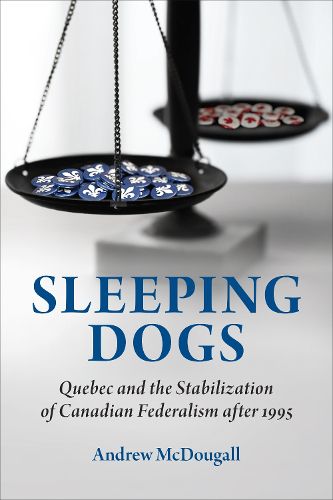Readings Newsletter
Become a Readings Member to make your shopping experience even easier.
Sign in or sign up for free!
You’re not far away from qualifying for FREE standard shipping within Australia
You’ve qualified for FREE standard shipping within Australia
The cart is loading…






This book sheds light on the decline of the Quebec sovereignty movement after the 1995 referendum, offering a fresh perspective on competing explanations.
What happened to the Quebec sovereignty movement after 1995? In Sleeping Dogs, Andrew McDougall reveals how a change in federalist strategy, combined with an improving political context, helped Canada stabilise its federal system and bury the "Quebec Question" for the foreseeable future.
The book identifies five potential reasons the Quebec sovereignty movement lost momentum and argues that all contributed to a political environment that benefited federalists. McDougall explores topics of elite accommodation, generational change, changing identity politics, economic globalisation, and constitutional fatigue. He argues that Canada's federalist political elites have capitalised on these developments to stabilise the country by dropping the national question - even when they might still hold very different visions of the Constitution. Building on 'constitutional abeyance' theory, the author conceives of this strategic change as the restoration of a constitutional abeyance among federalist actors. In considering recent history in light of subsequent developments, Sleeping Dogs is a timely and important attempt to understand the evolving situation in Quebec and Canadian federalism.
$9.00 standard shipping within Australia
FREE standard shipping within Australia for orders over $100.00
Express & International shipping calculated at checkout
This book sheds light on the decline of the Quebec sovereignty movement after the 1995 referendum, offering a fresh perspective on competing explanations.
What happened to the Quebec sovereignty movement after 1995? In Sleeping Dogs, Andrew McDougall reveals how a change in federalist strategy, combined with an improving political context, helped Canada stabilise its federal system and bury the "Quebec Question" for the foreseeable future.
The book identifies five potential reasons the Quebec sovereignty movement lost momentum and argues that all contributed to a political environment that benefited federalists. McDougall explores topics of elite accommodation, generational change, changing identity politics, economic globalisation, and constitutional fatigue. He argues that Canada's federalist political elites have capitalised on these developments to stabilise the country by dropping the national question - even when they might still hold very different visions of the Constitution. Building on 'constitutional abeyance' theory, the author conceives of this strategic change as the restoration of a constitutional abeyance among federalist actors. In considering recent history in light of subsequent developments, Sleeping Dogs is a timely and important attempt to understand the evolving situation in Quebec and Canadian federalism.